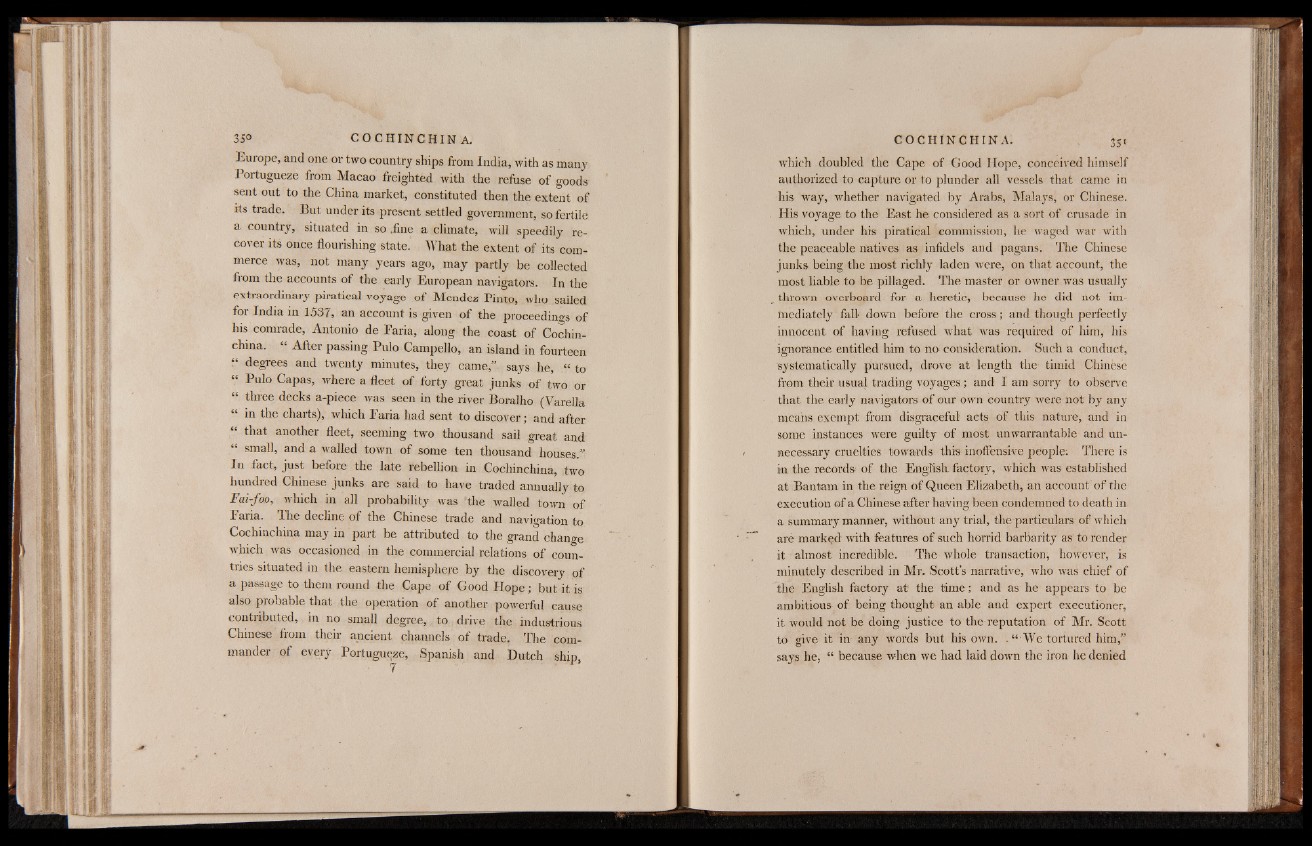
Europe, and one or two country ships from India, with as many
Portugueze from Macao freighted with the refuse of goods
sent out to the China market, constituted then the extent of
its trade. But under its present settled government, so fertile
a country, situated in so .fine a climate, will speedily recover
its once flourishing state. What the extent of its commerce
was, not many years ago, may partly be collected
from the accounts of the early European navigators. In the
extraordinary piratical voyage of Mendez Pinto, who sailed
for India in 1537, an account is given of the proceeding of
his comrade, Antonio de Faria, along the coast of Cochin-
china. “ After passing Pulo Campello, an island in fourteen
“ degrees and twenty minutes, they came/’ says he, “ to
Pulo Capas, where a fleet of forty great junks of two or
“ three decks a-piece was seen in the river Boralho (Varella
“ in the charts), which Faria had sent to discover; and after
“ that another fleet, seeming two thousand sail great and
“ small, and a walled town of some ten thousand houses.”
In fact, just before the late rebellion in Cochinchina, two
hundred Chinese junks are said to have traded annually to
Fai-foo, which in all probability was the walled town of
Faria. The decline of the Chinese trade and navigation to
Cochinchina may in part be attributed to the grand change
which was occasioned in the commercial relations of countries
situated in the eastern hemisphere by the discovery of
a passage to them round the Cape of Good Hope; but it is
also probable that the operation of another powerful cause
contributed, in no small degree, to drive the industrious
Chinese from their ancient channels of trade. The commander
of every Portugueze, Spanish and Dutch ship,
which doubled the Cape of Good Hope, conceived himself
authorized to capture or to plunder all vessels that came in
his way, whether navigated by Arabs, Malays, or Chinese.
His voyage to the East lie considered as a sort of crusade in
which, under his piratical commission, he waged war with
the peaceable natives as infidels and pagans. The Chinese
junks being the most richly laden were, on that account, the
most liable to be pillaged. The master or owner was usually
thrown overboard for a heretic, because he did not immediately
fall- down before the cross; and though perfectly
innocent of having refused what was required of him, his
ignorance entitled him to no consideration. Such a conduct,
systematically pursued, drove at length the timid Chinese
from their usual trading voyages; and I am sorry to observe
that the early navigators of our own country were not by any
means exempt from disgraceful acts of this nature, and in
some instances were guilty of most unwarrantable and unnecessary
cruelties towards this inoffensive people; There is
in the records of the English, factory, which was established
at Bantam in the reign of Queen Elizabeth, an account'of the
execution of a Chinese after having been condemned to death in
a summary manner, without any trial, the particulars of which
aré marked with features of such horrid barbarity as to render
it almost incredible. The whole transaction, however, is
minutely described in Mr, Scott’s narrative, who was chief of
the English factory a t the time; and as he appears to be
ambitious of being thought an able and expert executioner,
it would not be doing justice to the reputation of Mr. Scott
to give it in any words but his own. . “ AVe tortured him,”
says he, “ because when we had laid down the iron he denied